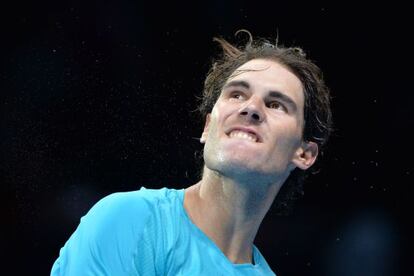"When you beat Ferrer, you know..."
Toni Nadal reveals the key moments in Rafa's return to the top

"I think this is something special. It shows that I love this sport, that I love competition and I have always fought throughout my career," said Rafa Nadal after his 7-6, 7-6 victory over Stan Wawrinka had assured him a semifinal place at the World Tour Finals and the year-end number one ranking. Whatever happens in London, Nadal will finish the season with 10 titles, including Roland Garros and the US Open, having started the year with serious doubts about his ability to compete at the highest level after spending seven months on the sidelines recovering from a serious knee problem.
Nadal's coach, Toni, describes his nephew's rise back to the top of the ATP Tour.
- Viña del Mar, February.
"It was a very complicated situation. Practically nothing worked, not his movement nor his game. Everything was doubts, we didn't know in which direction we were going. He reached the final more because of errors by his opponents than things he did well. It was better than we could have hoped for; he lost, but he was close to winning."
- Acapulco, February.
"It was a key moment. He beat [Nicolás] Almagro and [David] Ferrer. He played at a high level. He beat David, the world number four, who was in great form. When you beat Ferrer you know you can compete against everyone. He's a top player. But until then...
- Indian Wells, March.
Nadal wins his first hard-court title since 2010. "That was very important. He managed to beat three top-10 players: [Roger] Federer, [Tomas] Berdych and [Juan Martín] Del Potro, on a hard court. From there I knew he could compete against the best players on every surface. He wasn't moving as he did five years ago, but his game was good. He was able to control matches more than his rivals. He tried to move more economically, to take the ball further forward and to hit better shots.
- Clay, grass, hard.
"Up until Roland Garros it was maximum effort [Nadal lost in Montecarlo for the first time in nine years, to Novak Djokovic]. Rafael knew he had to be mentally perfect to stay on top. The clay season is the most delicate for us, because there is a lot of expectation. After Roland Garros, the pressure is off a little and there's some breathing space. At Wimbledon [Nadal lost in the first round to Steve Darcis] we couldn't and didn't play well. It's a very difficult court for us at that moment [because of Nadal's knee problems]. Then there's a break and when you start again you don't know how it's going to go. He went to Montreal without knowing what he could do. But he played well again. It was his best-ever summer hard-court season."
Tu suscripción se está usando en otro dispositivo
¿Quieres añadir otro usuario a tu suscripción?
Si continúas leyendo en este dispositivo, no se podrá leer en el otro.
FlechaTu suscripción se está usando en otro dispositivo y solo puedes acceder a EL PAÍS desde un dispositivo a la vez.
Si quieres compartir tu cuenta, cambia tu suscripción a la modalidad Premium, así podrás añadir otro usuario. Cada uno accederá con su propia cuenta de email, lo que os permitirá personalizar vuestra experiencia en EL PAÍS.
¿Tienes una suscripción de empresa? Accede aquí para contratar más cuentas.
En el caso de no saber quién está usando tu cuenta, te recomendamos cambiar tu contraseña aquí.
Si decides continuar compartiendo tu cuenta, este mensaje se mostrará en tu dispositivo y en el de la otra persona que está usando tu cuenta de forma indefinida, afectando a tu experiencia de lectura. Puedes consultar aquí los términos y condiciones de la suscripción digital.









































